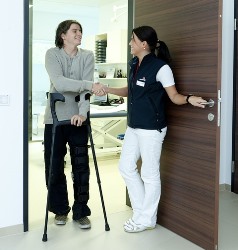How to Find the Best LPN or LVN Classes Near San Francisco California
 Once you have chosen a rewarding vocation in the field of nursing, it's essential that you choose a Licensed Practical Nurse (LPN) school near San Francisco CA that will deliver the proper training. If you live in Texas or California, then you will be searching for a Licensed Vocational Nurse (LVN) school instead. There is no difference, apart from the names, between an LPN and an LVN. They both undertake the same job functions and work in healthcare facilities under the guidance of Registered Nurses (RN) or Doctors. However their duties do differ depending on the state they practice in, which we will talk about in the next segment. When starting their search for schools, many prospective nursing students start with those that are the nearest to their residences or that are the least costly. Although price and location are important factors, they are not the only criteria that you should base your selection on. Other concerns, for instance if the schools are accredited or have high pass rates on the licensing exam are very important as well. There are various other questions that you should ask prospective schools before enrolling in a LPN or LVN course that we will discuss later in this article. But first, let's take a look at the function of an LPN and what is involved in the training and licensing process.
Once you have chosen a rewarding vocation in the field of nursing, it's essential that you choose a Licensed Practical Nurse (LPN) school near San Francisco CA that will deliver the proper training. If you live in Texas or California, then you will be searching for a Licensed Vocational Nurse (LVN) school instead. There is no difference, apart from the names, between an LPN and an LVN. They both undertake the same job functions and work in healthcare facilities under the guidance of Registered Nurses (RN) or Doctors. However their duties do differ depending on the state they practice in, which we will talk about in the next segment. When starting their search for schools, many prospective nursing students start with those that are the nearest to their residences or that are the least costly. Although price and location are important factors, they are not the only criteria that you should base your selection on. Other concerns, for instance if the schools are accredited or have high pass rates on the licensing exam are very important as well. There are various other questions that you should ask prospective schools before enrolling in a LPN or LVN course that we will discuss later in this article. But first, let's take a look at the function of an LPN and what is involved in the training and licensing process.
It Only Takes a Few Minutes to Start Your LPN or LVN Career Below
LPN and LVN Job Description

Licensed practical nurses (LPNs) are an important part of the healthcare team, supporting doctors and nurses in caring for patients of all ages. LPNs work closely with registered nurses (RNs) and physicians to provide patients with basic nursing care. An LPN’s duties can vary slightly depending on the healthcare setting and the state in which they work. For example, some states do not permit LPNs to administer medication or start IV drips. In other states, experienced LPNs are able to supervise and manage less-experienced nurses or nursing aides. Some of the typical duties of an LPN might include:
- Monitoring patients
- Taking patient vital signs and histories
- Performing routine assessments, such as checking blood pressure
- Changing bandages
- Inserting IVs or catheters
- Listening to patients’ concerns and reporting back to RNs and doctors
- Ensuring patients are comfortable
- Helping patients bathe or dress
LPNs can also work in a wide variety of healthcare settings, including San Francisco CA hospitals, doctor's offices and urgent care clinics. Due to an aging population, there is a growing need for LPNs in long-term care, such as rehabilitation centers, residential treatment centers and hospice. Most LPNs work in nursing and residential care facilities.
LPN Training
Selecting the right LPN program is an important first step. Programs lead to a certificate, diploma, or an associate degree. Coursework for certificate, diploma, and degree programs can be completed online or in person. Hybrid programs allow aspiring LPNs to complete required courses in a virtual setting, while clinical hours must be fulfilled in person at an approved local site. Regardless of academic setting or type of program, LPNs in training cover much of the same core coursework. Full-time students usually take 12-15 credits per semester, learning necessary skills and knowledge by studying theories, completing lab assignments, and spending time in clinical settings. After completing LPN education requirements and earning their credential, students must pass the National Council Licensure Examination for Practical Nursing (NCLEX-PN) before they can be licensed and hired to practice as an LPN.Taking LPN and LVN Online Classes
 Enrolling in LPN schools online is emerging as a more in demand way to obtain training and acquire a nursing certificate or degree in San Francisco CA. Certain schools will require attendance on campus for part of the training, and almost all programs call for a certain number of clinical rotation hours carried out in a local healthcare center. But since the rest of the training can be accessed online, this alternative may be a more convenient solution to finding the time to attend classes for many students. Concerning tuition, many online degree programs are less costly than other on campus options. Even supplemental expenses such as for commuting and study materials may be minimized, helping to make education more economical. And many online programs are accredited by U.S. Department of Education recognized organizations. Therefore if your work and family commitments have left you with limited time to work toward your academic goals, it could be that an online LPN school will make it more convenient to fit a degree into your busy schedule.
Enrolling in LPN schools online is emerging as a more in demand way to obtain training and acquire a nursing certificate or degree in San Francisco CA. Certain schools will require attendance on campus for part of the training, and almost all programs call for a certain number of clinical rotation hours carried out in a local healthcare center. But since the rest of the training can be accessed online, this alternative may be a more convenient solution to finding the time to attend classes for many students. Concerning tuition, many online degree programs are less costly than other on campus options. Even supplemental expenses such as for commuting and study materials may be minimized, helping to make education more economical. And many online programs are accredited by U.S. Department of Education recognized organizations. Therefore if your work and family commitments have left you with limited time to work toward your academic goals, it could be that an online LPN school will make it more convenient to fit a degree into your busy schedule.
What to Ask LPN and LVN Schools
Once you have decided on obtaining your LPN certificate, and if you will attend classes on campus or on the web, you can utilize the following pointers to begin narrowing down your choices. As you no doubt are aware, there are many nursing schools and colleges near San Francisco Ca as well as within California and throughout the United States. So it is essential to lower the number of schools to select from so that you will have a workable list. As we previously discussed, the site of the school along with the price of tuition are probably going to be the primary two factors that you will look at. But as we also stressed, they should not be your sole qualifiers. So prior to making your ultimate decision, use the following questions to evaluate how your selection compares to the other programs.
- Accreditation. It's a good idea to make sure that the certificate program in addition to the school are accredited by a U.S. Department of Education recognized accrediting organization. In addition to helping ensure that you obtain an excellent education, it may help in obtaining financial aid or student loans, which are oftentimes not offered for non-accredited schools near San Francisco California.
- Reputation. Visit online rating companies to see what the evaluations are for all of the LPN schools you are looking into. Ask the accrediting organizations for their reviews too. Additionally, get in touch with the California school licensing authority to find out if there are any complaints or compliance issues. Finally, you can call some local San Francisco CA healthcare organizations you're interested in working for after graduation and ask what their judgements are of the schools as well.
- Internship Programs. The most effective way to get experience as a Licensed Practical Nurse is to work in a clinical setting. Essentially all nursing degree programs require a certain number of clinical hours be completed. Many states have minimum clinical hour mandates for licensing also. Find out if the schools have associations with nearby San Francisco CA community hospitals, clinics or labs and assist with the placing of students in internships. Also, it's important that you choose a school that offers clinical training in the type of facility you are most interested in. For example, if you want training and experience in pediatric care, make sure that the school you choose provides adequate clinical rotation in an area Pediatric Hospital.
- Licensing Preparation. Licensing criteria for LPNs differ from state to state. In all states, a passing score is needed on the National Council Licensure Examination (NCLEX-PN) in addition to graduation from an approved school. Certain states require a specific number of clinical hours be completed, as well as the passing of additional tests. It's imperative that the school you are attending not only provides an excellent education, but also preps you to comply with the minimum licensing standards for California or the state where you will be practicing.
- Graduation and Job Placement Rates. Find out from the LPN programs you are considering what their graduation rates are as well as how long on average it takes students to complete their programs. A low graduation rate may be an indication that students were unhappy with the program and dropped out. It's also imperative that the schools have high job placement rates. A high rate will not only verify that the school has a favorable reputation within the San Francisco CA healthcare community, but that it also has the network of relationships to help students attain a position.
- NCLEX Exam Pass Rate. Once you receive your certificate or diploma, you must sign up for and pass the National Council Licensure Examination for Practical Nurses (NCLEX-PN). Enrolling in a school with at least a 75% pass rate is highly preferred. Lower pass rates may indicate that a school’s program, curriculum or instructors are ineffective in teaching its students. You can find out from the school what their passing rate is for the last 5 years, or request the information from the State Board of Nursing.
Learn How to Become an LVN or LPN in San Francisco
Choose the Right San Francisco Licensed Vocational Nurse Program
Deciding on the right Licensed Practical Nurse school is arguably the most crucial phase to launching a new career in the healthcare field. There are many factors that you should think about when picking a nursing school. These aspects will be prioritized differently contingent on your current career objectives, lifestyle, and economic situation. As we have highlighted in this content, it is important that you choose an LPN school and a certificate or degree program that are each accredited and have outstanding reputations within the health care community. By utilizing our list of qualifying questions, you will be able to produce a short list of schools to select from so that you can make your final selection. And with the appropriate degree and training, combined with your hard work and desire to succeed, you can become a Licensed Practical Nurse in San Francisco California.
SAN FRANCISCO LPN OR LVN COURSES ONLINE | SAN FRANCISCO HOW TO BECOME AN LPN OR LVN
